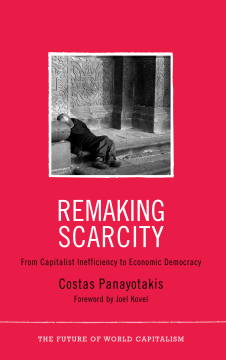
Additional Information
Book Details
Abstract
The dominant schools of neoclassical and neoliberal economics tell us that material scarcity is an inevitable product of an insatiable human nature. Against this, Costas Panayotakis argues that scarcity is in fact a result of the social and economic processes of the capitalist system.
The overriding importance of the logic of capital accumulation accounts for the fact that capitalism is not able to make a rational use of scarce resources and the productive potential at the disposal of human society. Instead, capitalism produces grotesque inequalities and unnecessary human suffering, a toxic consumerist culture that fails to satisfy, and a deepening ecological crisis.
Remaking Scarcity is a powerful challenge to the current economic orthodoxy. It asserts the core principle of economic democracy, that all human beings should have an equal say over the priorities of the economic system, as the ultimate solution to scarcity and ecological crisis.
'An excellent contribution to attempts to think beyond the current crisis of capitalism'
Dr Benjamin Selwyn, Senior Lecturer in International Relations, University of Sussex
'An extremely scholarly, insightful and well-argued contribution - with ecology and feminism given the attention often denied them - to this crucially important literature. Highly Recommended'
Bertell Ollman, Department of Politics, New York University, author of Dance of the Dialectic: Steps in Marx's Method
'Extremely timely ... Panayotakis develops a critical approach to an issue that is central to neo-classical economics but rarely the subject of critical analysis'
Molly Scott Cato, Reader in Green Economics, Cardiff University
'This is a fine book, full of thoughtful considerations on the most pressing issues facing us'
Ted Benton, Environmental Ethics
'Combines theoretical boldness and the determination to extend Marxian theory. It deserves to be read as another impressive product of the global rethinkings of Marxism now engaged in building a Marxism for the twenty-first century'
Richard D. Wolff, Professor of Economics Emeritus, University of Massachusetts, Amherst
Table of Contents
| Section Title | Page | Action | Price |
|---|---|---|---|
| Cover | Cover | ||
| Contents | v | ||
| Foreword | vii | ||
| Preface | xi | ||
| 1. Capitalism, Scarcity, and Economic Democracy | 1 | ||
| Plan of the Book | 7 | ||
| 2. The Neoclassical Approach to Scarcity | 10 | ||
| 3. Scarcity and Capital Accumulation | 18 | ||
| The Source of Capitalism's Technological Dynamism | 18 | ||
| Economic Crises and the Cyclical Nature of Capitalism's Configurations of Scarcity | 21 | ||
| Scarcity and the Long-term Evolution of the Capitalist System | 23 | ||
| Do We Need to Abolish Scarcity? | 26 | ||
| Scarcity and the Undemocratic Logic of Capital | 32 | ||
| A Note on the Soviet Experience | 35 | ||
| 4. Scarcity, Capitalist Exploitation, and Consumption | 38 | ||
| Is Scarcity Only the Product of Inflated Needs? | 41 | ||
| Consumerism and Capitalism's Configurations of Scarcity | 47 | ||
| Consumerism, Exploitation, and Economic Democracy | 50 | ||
| 5. Economic Democracy and the Multiplicity of Social Inequalities and Struggles | 57 | ||
| Struggles Over the Profit Rate | 57 | ||
| Configurations of Scarcity and Capitalism's Cross-Cutting Social Inequalities and Struggles | 59 | ||
| Capitalism, Scarcity, and Households | 61 | ||
| Economic Democracy, Households, and the Question of Time | 62 | ||
| Capital and the Vicious Cycles Undercutting Economic Democracy | 64 | ||
| The Struggle Over the Working Day as a Struggle for Economic Democracy | 67 | ||
| The Cultural Dimension of the Struggle for Economic Democracy | 70 | ||
| 6. Capitalism, Scarcity, and Global Inequalities | 72 | ||
| Global Inequalities as a Dimension of Capitalism's Configurations of Scarcity | 74 | ||
| The Growth of Global Inequalities: A Brief Historical Overview | 78 | ||
| The Struggle(s) Against Neoliberalism and the Logic of Profit | 88 | ||
| 7. Scarcity and the Deepening Ecological Crisis | 93 | ||
| The Deepening Ecological Crisis | 94 | ||
| Ecological Problems as Economic Externalities? | 97 | ||
| Political Economy, Externalities, and the Role of the State | 103 | ||
| Externalities, Effficiency, and the Conflict Approach to Scarcity | 106 | ||
| The Link Between Cross-Cutting Inequalities and Ecological Problems | 109 | ||
| 8. Imagining Economic Democracy: Two Models | 113 | ||
| Post-Capitalist Alternatives: Market Socialism Versus Democratic Planning | 114 | ||
| David Schweickart's 'Economic Democracy' | 115 | ||
| Albert and Hahnel's Model of a Participatory Economy | 119 | ||
| Economic Democracy and the Debate on Post-Capitalist Alternatives | 124 | ||
| 9. The Way Forward: Economic Democratization as a Strategy of Reforms and Fundamental Social Change | 129 | ||
| Conclusion | 149 | ||
| Humorous Appendix: Austerity Nut and His Message | 155 | ||
| Notes | 159 | ||
| Bibliography | 171 | ||
| Index | 201 |
